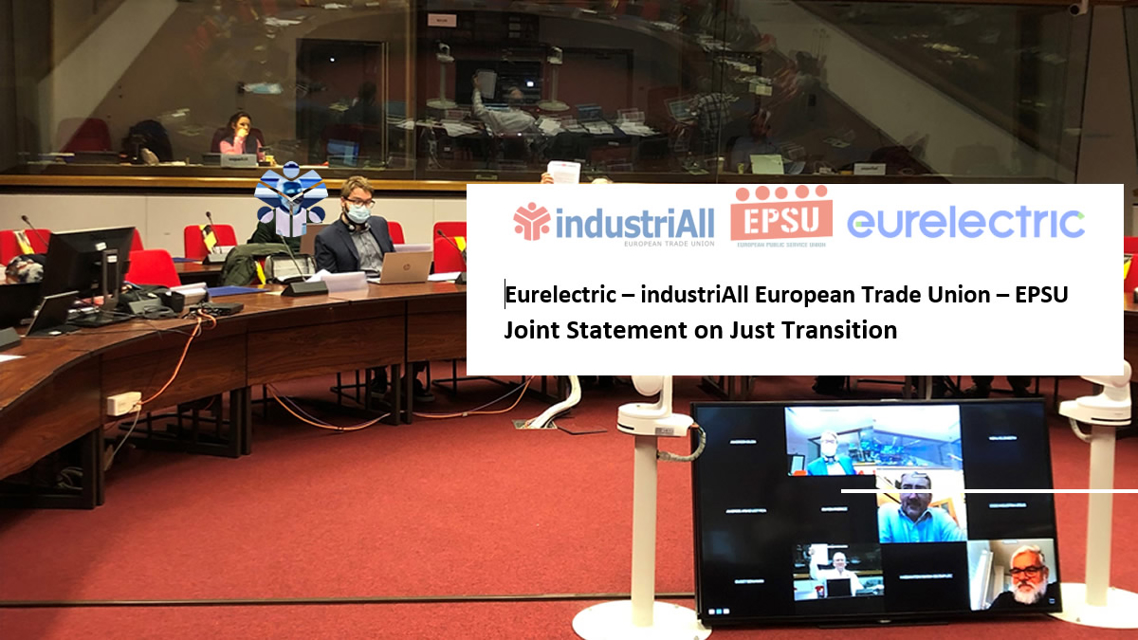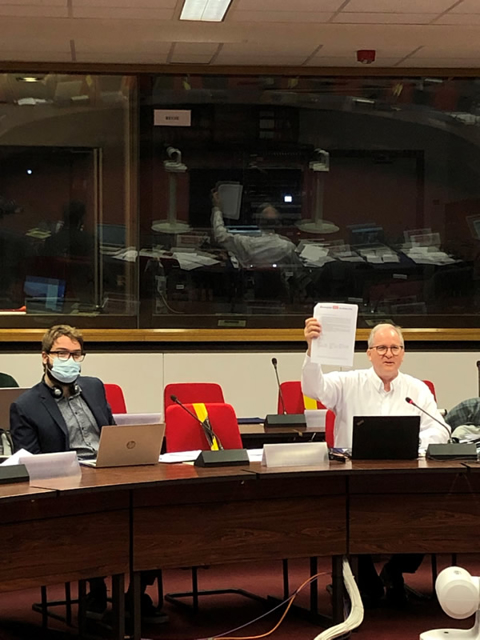Bernd Frieg, President of the European Sectoral Social Dialogue Committee Electricity on behalf of industriAll European Trade Union, stated: “We are very pleased to have concluded a strong statement on Just Transition with the employers of the electricity sector. It is essential to work together to achieve our objectives and to promote collective bargaining at all levels: this will be fundamental to see Just Transition happening in companies, regions and EU countries.”
The European electricity sector and its workforce are key actors in achieving climate objectives as the sector undergoes a major transformation. The decisions taken in the coming months will define the profile of the electricity sector for the next years and for many decades, and social partners are fully committed to managing the change and guaranteeing quality employment conditions.
Judith Kirton-Darling, Deputy General Secretary of industriAll Europe, said: “The statement is significant because it translates our message about Just Transition into concrete demands. It insists on the fact that Just Transition needs adequate financing and improved permitting procedures, as well as coherent social policies to ensure that no one is left behind. The statement also contains strong messages about collective bargaining and the full involvement of social partners, which will be essential to achieve this transition.”
At the end of the statement, the European Social Partners set out their core demands and commitments, calling on the EU institutions and Member States for:
- Coherent and concrete Just Transition Frameworks, bringing together all possible policy tools on the EU level to support the workforce in the energy transition.
- A European Observatory of Just Transition in the various regions and sectors, involving social partners, to assess Just Transition in terms of social impact and economic and labour market developments on the ground.
- A European strategy for the electricity sector and the transition of its workforce, and the establishment of a coherent regulatory framework in which the sector operates. This strategy should be evaluated and effectively guarantee - in the context of the ecological transition - that the National Energy and Climate Plans of the Member States are consistent with the EU Green Deal objectives and guarantee the security of the European electricity network, as well as a strong social dimension embedded in a coherent Just Transition Framework.
- A concrete monitoring of European mechanisms and national plans regarding the different funds allocated to help the transition (NextGenerationEU, Just Transition Fund, Modernisation Fund, etc.) in order to make sure that these funds are coherent with the targets of a Just Transition (maintaining employment, creating quality employment, involving social partners in the design of plans, etc.) while mitigating the risks associated with sudden rises in the prices of energy sources.
- A European framework on the anticipation and management of change which provides for a strengthening of industrial relations and social dialogue embedded in the EU Just Transition Framework. The framework should promote the active involvement and participation of the workforces in terms of developing company strategies that are sustainable and correspond with investment decisions. It should also guarantee that collective bargaining remains the priority and the most effective tool at all relevant levels to ensure the comprehensive planning of the transition of the workforce, including detailed social plans in cases of restructuring.
- Requirement for countries to implement inclusive governance and participatory mechanisms, social dialogue and full transparency of transition planning.
- Investment and clear European and national guidelines for the adaptation of workplaces to climate change.
- Acceleration of new power generation projects - from investment decision to final implementation - preserving a democratic debate. Europe’s electricity could be carbon-free 5-10 years earlier than previously anticipated, thus helping transport, heating and industries to speed up their decarbonisation. The electricity sector is ready (and committed) to play a leading role and deliver the carbon-free electricity needed for achieving the Green Deal’s ambition and providing European citizens with an affordable energy, technical progress and quality of life, while combating energy poverty and the deterioration of purchasing power. To deliver on the ambition, it is critical to have a relevant framework (the right investment signals, technological neutrality approach, shorter permitting lead time for new electricity projects, compatibility with the expectations of a public service, etc.) in order to overcome the obstacles, while maintaining an open and democratic local and regional debate.
- The development of new business models during the transition resulting from decarbonisation and digitalisation. This means continuous changes in terms of job profiles and the need to offer employees continuous training and lifelong learning to maintain a qualified workforce. At the same time, all employees should have the contractual right to continuous training and lifelong learning to pursue their personal development. A comprehensive, high quality continuous training and lifelong learning system will allow the European electricity sector to create a culture that promotes the mobility of employees inside companies as well as between companies, sectors and countries. The transferability of skills is therefore of utmost importance and needs to be guaranteed through the proper validation and recognition of competences and qualifications gained throughout a worker’s career.
- Anticipation of skills needs, providing workers - especially those entering the sector - with a skills up-date/grade to guarantee a well-functioning electricity industry and to ensure workers’ employability.
The European Social Partners in the electricity sector are committed to:
- Promoting social dialogue and collective bargaining at all levels to ensure the inclusive planning of the employment transition at the appropriate level and to guarantee that newly created jobs are covered by collective agreements, ensuring quality employment and an attractive working environment. The social partners fully endorse fundamental worker’s rights, in particular the freedom to organise and to access trade unions.
- Discussion and promotion of good practice cases of Just Energy Transition and its evolution.
- Supporting the anticipation of skills and the need to provide workers - especially those entering the sector - with a skills update/grade to guarantee a well-functioning electricity industry and to ensure workers’ employability.
- Supporting and promoting reskilling and upskilling through continuous professional development and life-long learning with real certification for new, green jobs that is recognised across Europe. This will also have to be in line with the transition to digitalisation.
IndustriAll Europe, EPSU, Eurelectric, and all their national members, will now work on the implementation of this statement to make Just Transition happen at all levels.
Read the full statement here DE EN FR
Contact: Andrea Husen-Bradley (press and communication), Sophie Grenade (policy adviser)


